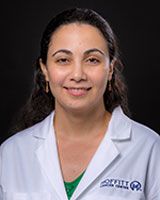Article
Adjuvant Nivolumab/Ipilimumab Sustains RFS Benefit in Melanoma at 3 Years
Author(s):
The combination of adjuvant nivolumab and ipilimumab led to a 3-year relapse-free survival rate of 71% in patients with high-risk resected stage IIIC/IV melanoma.
Zeynep Eroglu, MD, Moffitt Cancer Center

Zeynep Eroglu, MD
The combination of adjuvant nivolumab (Opdivo) and ipilimumab (Yervoy) led to a 3-year relapse-free survival (RFS) rate of 71% in patients with high-risk resected stage IIIC/IV melanoma.
However, the results of the small 40-patient study showed a “significant toxicity profile with the use of ipilimumab and nivolumab in the adjuvant setting,” according to lead author Zeynep Eroglu, MD, Moffitt Cancer Center. “The toxicity of ipilimumab/nivolumab does seem to be higher in the adjuvant setting compared to what’s been reported in the metastatic setting.”
Eroglu, who presented the data at the 2017 World Congress of Melanoma also noted that, “What we don’t know yet is how the adjuvant ipilimumab/nivolumab combination may compare to single-agent PD-1 therapy—whether there would be any benefit in relapse-free survival or overall survival that may, in any way, justify the increased toxicity of [the combination].”
The study was conducted entirely at Moffitt Cancer Center and included 40 patients with stage IIIC or IV melanoma that was rendered disease free. In cohort A (n = 20), patients received an induction regimen of 1 mg/kg of nivolumab plus 3 mg/kg of ipilimumab every 3 weeks for 4 doses, followed by maintenance nivolumab at 3 mg/kg every 2 weeks for 2 years. Patients in cohort B (n = 20) received an induction regimen of 3 mg/kg of nivolumab plus 1 mg/kg of ipilimumab every 3 weeks for 4 doses, followed by the same maintenance regimen and schedule as Cohort A.
The primary outcome measure was treatment tolerability, with RFS and overall survival (OS) as secondary endpoints.
In cohort A, 75% of patients were male and the median age was 50 (range, 22-78). Forty-five percent of patients had stage IIIC disease and 55% of patients had stage IV. ECOG performance was status 0 in 55% of patients and 1 in 45%. Seven (47%) of 15 patients with known BRAF status were BRAFV600 positive. Among all 20 patients, 7 (35%) had prior systemic therapy (no checkpoint inhibitors).
In cohort B, 65% of patients were male and the median age was 55 (range, 29-77). Fifty-five percent of patients had stage 3C disease and 45% of patients had stage 4. ECOG performance status was 0 in 35% of patients and 1 in 65%. Seven of 11 (64%) patients with known BRAF status were BRAFV600 positive. Among all 20 patients, 4 (20%) had prior systemic therapy (no checkpoint inhibitors).
In cohort A, 50% of patients completed their induction regimen, with an average of 3 cycles. Thirty percent of patients completed induction plus 2 years of maintenance, with an average of 34.8 cycles.
In cohort B, 65% of patients completed their induction regimen with an average of 3.6 cycles. Thirty percent of patients completed induction plus 2 years of maintenance, with an average of 36.3 cycles.
Among all 40 patients, the median RFS has not been reached yet at a median follow-up of 2.9 years. The median follow-up was 3.4 years for cohort A and 2.5 years for cohort B. The 3-year RFS rates were 70% (95% CI, 45-85) for cohort A and 75% (95% CI, 50-89) for cohort B. The 2-year RFS rates were 80% (95% CI, 55-92) and 75% (95% CI, 50-89), respectively. The median RFS was not reached for either cohort.
Among the all 20 patients with stage IV disease across both cohorts, the median follow-up was 2.9 years. The 3-year and 2-year RFS rates were 74% (95% CI, 48-88) and 80% (95% CI, 55-92), respectively.
One patient has died and the median OS has not been reached.
Elevation of AST/ALT, endocrine disorders, and nausea occurred in both cohorts, but were significantly higher in cohort A (lower nivolumab, higher ipilimumab doses).
Ninety percent (n = 18) of patients in cohort A had treatment-related grade 3/4 adverse events (AEs), with 11 patients stopping therapy for a treatment-related AE of any grade.
“Giving ipilimumab at 1 mg/kg and nivolumab at 3 mg/kg seemed to be somewhat better tolerated, but still with a significant toxicity profile,” said Eroglu.
Single-agent ipilimumab was approved by the FDA in October 2015 for the adjuvant treatment of patients with stage III melanoma with pathologic involvement of regional lymph nodes >1 mm who have undergone complete resection including total lymphadenectomy.
Earlier this month the FDA granted a priority review to a supplemental biologics license application for single-agent nivolumab to treat patients with melanoma who are at high risk of disease recurrence following complete surgical resection.
The ongoing phase III CheckMate 915 trial is comparing the nivolumab/ipilimumab combination to nivolumab monotherapy in patients with resected stage IIIB/C/D or IV melanoma.
The trial is using a different dosing regimen than either cohort of the small Moffitt study. Ipilimumab is being given at 1 mg/kg every 6 weeks with a flat dosing of 240 mg of nivolumab every 2 weeks.
“Hopefully, that will be a better tolerated regimen,” said Eroglu.
Eroglu, Z. Mature results of combination nivolumab (NIVO) plus ipilimumab (IPI) as adjuvant therapy in stage IIIC/IV melanoma (MEL). Presented at: 2017 World Congress of Melanoma; October 18-21, 2017; Brisbane, Australia. Presentation SMR09-6.
<<< View more from the World Congress of Melanoma
Seventy percent (n = 14) of patients in cohort B had treatment-related grade 3/4 AEs, with 9 patients stopping therapy for a treatment-related AE of any grade.









